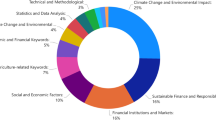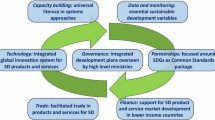Abstract
The private sector plays an active role in implementation of mechanisms concerning the mitigation of climate change. In spite of that, the corporate actors play a limited direct role in international arenas when it comes to negotiating the design of climate and energy regime. The climate and energy governance in the United Nations system remains mostly state-centric, but the active participation of corporate actors in negotiation of climate and energy regimes is essential to increase the effectiveness of their governance. Business is not just a subject of a regulatory climate and energy imposed by the state; rather, business is an intrinsic part of the fabric of climate and energy governance, as “rule-maker,” particularly in the many voluntary regimes. However, the architecture in place should guarantee that the private sector does not highjack the decisions and its positions are balanced by other non-governmental actors in the process. This article analyzes the role that the private sector can play in the global climate and energy governance. The private sector does not only play a “rule taker” role in the climate change and energy regime. Indeed, they are not passive observers as they influence through indirect means. The results suggest that the private sector is able to play a key role in global climate and energy governance based on the principle of multi-stakeholder participation in global decision-making, but the architecture should be able to balance the goods and bads of private direct influence in international regimes.
Similar content being viewed by others
Notes
Throughout this paper, the term “rule-taker” will be used to refer to an actor who follows, sometimes against his own will, a set of rules established by other actors. A “rule-maker,” by contrast, chooses to take part directly in the construction of the rules of the game.
References
Andrade, J. C. S., & Taravella, R. (2009). Les oubliés de la réforme de la gouvernance internationale de l’environnement. Critique Internationale, 45(1), 119–139.
Bäckstrand, K. (2006). Multi-stakeholder partnerships for sustainable development: Rethinking legitimacy, accountability and effectiveness. European Environment, 16(1), 290–306.
Benedick, R. E. (1998). Ozone diplomacy. New directions in safeguarding the planet. CambridgeUSA: Harvard University Press.
Bled, A. (2007). Global environmental politics: Regulation for or against the private sector? The case of the Cartagena Protocol on biosafety. Political Perspectives, 1(5), 20–42.
Brühl, T. (2002). The privatisation of international climate governance. In F. Biermann, R. Brohm & K. Dingwerth (Eds.) Proceedings of the 2001 Berlin conference on the human dimensions of global environmental change “Global environmental change and the nation state” (pp. 371–380). Potsdam: Potsdam Institute for Climate Impact Research.
Bruno, K. (2002). Greenwash +10: The UN’s Global Compact, Corporate Accountability and the Johannesburg Earth Summit. California: CorpWatch.
Campbell, L. (1998). Emission trading, joint implementation and the clean development mechanism: The role of private sector and the other non-state actors in implementation. In W. B. Chambers (Ed.), Global climate governance: Inter-linkages between the Kyoto Protocol and other multilateral regimes (pp. 15–30). Tokyo: UNU/IAS.
CDP. (2013). Members & Signatories. http://www.cdproject.net/en-US/Pages/HomePage.aspx. Accessed October 27, 2013.
Clapp, J. (2005). Global environmental governance for corporate responsibility and accountability. Global Environmental Politics, 5(3), 23–34.
Clapp, J., & Dauvergne, P. (2005). Paths to a Green World: The political economy of the global environment. Cambridge, Mass.: MIT Press.
Clapp, J., & Thistlethwaite, J. (2012). Private voluntary programs in environmental governance: Climate change and the financial sector. In K. Ronit (Ed.), Business and climate policy: The potentials and pitfalls of private voluntary programs (pp. 53–74). New York: United Nations University Press.
Dawkins and Fraas. (2011). Coming clean: The impact of environmental performance and visibility on corporate climate change disclosure. Journal of Business Ethics, 100(2), 303–322.
Dunn, S. (2005). Down to business on climate change: An overview of corporate strategies. In K. Begg, F. Woerd, & D. L. Levy (Eds.), The business of climate change: Corporate responses to Kyoto (pp. 31–46). Sheffield: Greenleaf.
Eberlein, B., & Matten, D. (2009). Business responses to climate change regulation in Canada and Germany: Lessons for MNCs from emerging economies. Journal of Business Ethics, 86(2), 241–255.
Falkner, R. (2003). Private environmental governance and international relations: Exploring the links. Global Environmental Politics, 3(2), 72–87.
Falkner, R. (2007). Business power and conflict in international environmental politics. Basingstoke: Palgrave Macmillan.
Gangale, F., & Mengoline, A. (2011). CDM contribution to RES penetration in the power generation sector of China and India. International Journal of Sustainable Development and World Ecology, 18(4), 283–290.
Garcia-Johnson, R. (2000). Exporting environmentalism: US multinational chemical corporations in Brazil and Mexico. Cambridge, MA: MIT Press.
ICE (2013). Chicago Climate Exchange. http://www.theice.com/ccx.jhtml. Accessed October 31, 2013.
IPCC. (2007). Climate change 2007: Synthesis report. In Core Writing Team, R. K. Pachauri & A. Reisinger (Eds.), Contribution of working groups I, II and III to the fourth assessment report of the intergovernmental panel on climate change. Geneva: IPCC.
IPCC. (2013). Summary for policymakers. In T. F. Stocker, D. Qin, G.-K. Plattner, M. Tignor, S. K. Allen, J. Boschung, A. Nauels, Y. Xia, V. Bex & P. M. Midgley (Eds.), Climate change 2013: The physical science basis. Contribution of working group I to the fifth assessment report of the intergovernmental panel on climate change. Cambridge: Cambridge University Press.
Ivanova, M., Gordon, D., & Roy, J. (2007). Towards institutional symbiosis: Business and the United Nations in environmental governance. RECIEL, 16(2), 123–134.
Kalfagianni, A. (2013). Addressing the global sustainability challenge: The potential and pitfalls of private governance from the perspective of human capabilities. Journal of Business Ethics,. doi:10.1007/s10551-013-1747-6.
Kanie, N., et al. (2013). Green pluralism: Lessons for improved environmental governance in the 21st century. Environment: Science and Policy for Sustainable Development, 55(5), 14–30. doi:10.1080/00139157.2013.824339.
Karakosta, C., Doukas, H., & Psarras, J. (2012). Carbon market and technology transfer: Statistical analysis for exploring implications. International Journal of Sustainable Development and World Ecology, 19(4), 311–320.
Karakosta, C., Marinakis, V., Letsou, P., & Psarras, J. (2013). Does the CDM offer sustainable development benefits or not? International Journal of Sustainable Development and World Ecology, 20(1), 1–8.
Knox-Hayes, J., & Levy, D. (2011). The politics of carbon disclosure as climate governance. Strategic Organization, 9(1), 91–99.
Kolk, A., & Hoffmann, V. (2007). Business, climate change and emissions trading: Taking stock and looking ahead. European Management Journal, 25(6), 411–414.
Kolk, A., & Pinkse, J. (2007). Multinationals’ political activities on climate change. Business and Society, 46(2), 201–228.
Kollmuss, A., Zink, H., & Polycap, C. (2008). Making sense of the voluntary carbon market: A comparison of carbon offset standards. Germany: WWF.
Kulovesi, K. (2007). The private sector and the implementation of the Kyoto Protocol: Experiences, challenges and prospects. RECIEL, 16(2), 145–157.
Le Prestre, P. (2005). Protection de l’environnement et relations internationales: les défis de l’écopolitique mondiale. Paris: Armand Colin.
Levy, D. L., & Jones, C. A. (2008). Business strategies and climate change, United States. http://www.eoearth.org/article/Business_strategies_and_climate_change,_United_States. Accessed September 21, 2009.
Levy, D. L., & Kolk, A. (2002). Strategic responses to global climate change: Conflicting pressures on multinationals in the oil industry. Business and Politics, 4(3), 275–300.
Levy, D. L., & Newell, P. J. (2000). Oceans apart? Business responses to global environmental issues in Europe and the United States. Environment, 42(9), 8–20.
Levy, D. L., & Newell, P. J. (Eds.). (2005). The business of global environmental governance. Cambridge, Mass.: MIT Press.
Morgera, E. (2006). The UN and corporate environmental responsibility: Between international regulation and partnerships. RECIEL, 15(1), 93–109.
Najam, A., Papa, M., & Taiyab, N. (2006). Global environmental governance: A reform agenda. Winnipeg, Manitoba: IDDRI.
Newell, P. (2000). Climate change: Non-state actors and the politics of the greenhouse. Cambridge: Cambridge University Press.
O’Neill, K. (2009). The environment and international relations. UK: Cambridge University Press.
Okereke, C., & Bulkeley, H. (2007). Conceptualizing climate change governance beyond the international regime: A review of four theoretical approaches. Tyndall Centre Working Paper 112.
Peters, G. F., & Romi, A. M. (2013). Does the voluntary adoption of corporate governance mechanisms improve environmental risk disclosures? Evidence from greenhouse gas emission accounting. Journal of Business Ethics. http://ssrn.com/abstract=2163074. Accessed April 04, 2013.
Pinkse, J., & Kolk, A. (2009). International business and global climate change. London: Routledge.
Pinto, R., & Puppim de Oliveira, J. (2008). Implementation challenges in protecting the global environmental commons: The case of climate change policies in Brazil. Public Administration and Development, 28(5), 340–350.
Porter, G., & Brown, J. W. (1996). Global environmental politics (2nd ed.). Boulder, Colorado: Westview Press.
Prado-Lorenzo, J.-M., & Garcia-Sanchez, I.-M. (2010). The role of the board of directors in disseminating relevant information on greenhouse gases. Journal of Business Ethics, 97(3), 391–424.
Pulver, S. (2005). Organising business: Industry NGOs in the climate debates. In K. Begg, F. Woerd, & D. L. Levy (Eds.), The business of climate change: Corporate responses to Kyoto (pp. 47–60). Sheffield: Greenleaf.
Puppim de Oliveira, J. (2005). Enforcing protected area guidelines in Brazil: What explains participation in the implementation process? Journal of Planning Education and Research - JPER, 24(4), 420–436.
Rasche, A., Baur, D., Huijstee, M., Ladek, S., Naidu, J., Perla, C., et al. (2008). Corporations as political actors—A report on the first swiss master class in corporate social. Responsibility Journal of Business Ethics, 80(2), 151–173.
Rasche, A., & Gilbert, D. U. (2012). Institutionalizing global governance: The role of the United Nations global compact. Business Ethics: A European Review, 21(1), 100–114.
Ruggie, J. G. (2002). The theory and practice of learning networks: Corporate social responsibility and the global compact. Journal of Corporate Citizenship, 5(1), 27–36.
Sampson, G. (1998). WTO rules and climate change: The need for policy coherence. In W. B. Chambers (Ed.), Global climate governance: Inter-linkages between the Kyoto Protocol and other multilateral regimes (pp. 12–25). Tokyo: UNU/IAS.
Schmidheiny, S. (1992). Changing course: A global business perspective on development and the environment. Cambridge, MA: The MIT Press.
Sethi, S. P., & Schepers, D. H. (2013). United Nations global compact: The promise–performance gap. Journal of Business Ethics,. doi:10.1007/s10551-013-1629-y.
Streck, C. (2004). New partnerships in global environmental policy: The Clean Development Mechanism. The Journal of Environmental Development, 13(1), 295–322.
United Nations Global Compact. (2014). Global compact governance. www.unglobalcompact.org. Accessed April 30, 2014.
Author information
Authors and Affiliations
Corresponding author
Rights and permissions
About this article
Cite this article
Andrade, J.C.S., Puppim de Oliveira, J.A. The Role of the Private Sector in Global Climate and Energy Governance. J Bus Ethics 130, 375–387 (2015). https://doi.org/10.1007/s10551-014-2235-3
Received:
Accepted:
Published:
Issue Date:
DOI: https://doi.org/10.1007/s10551-014-2235-3




